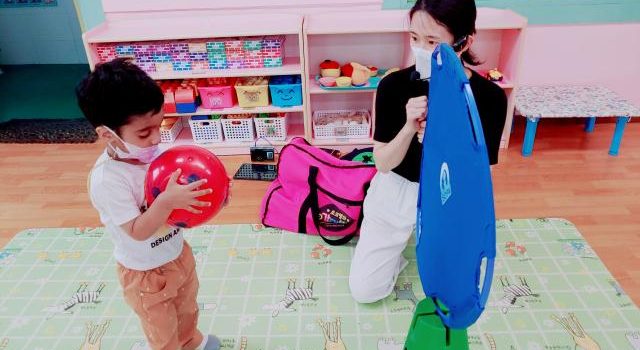For kids, play is more than just enjoyable it is also for child’s development. It is an effective instrument that fosters social, emotional, mental, and physical development. Children learn vital life skills, form relationships with others, and explore their surroundings through a variety of play activities. Play improves motor skills, creativity, and problem-solving abilities while also promoting general health and well-being. This article discusses the value of play and how it helps develop youngsters into healthy, well-rounded adults.
Play Promotes Better Brain Development and Thought:
Encouraging critical thinking and stimulating the brain through play is beneficial for children. It helps them develop focus, memory, and problem-solving abilities. Activities such as playing role-playing games, solving riddles, and building with blocks are all excellent for cognitive development. Through imaginative play and exploration, children foster curiosity and learn new ideas. Play provides mental exercise that prepares children for lifelong learning.
Youngsters Form Social Bonds By Play: Child’s Development
Engaging in group games and activities allows children to participate in valuable social interaction. Play promotes teamwork and helps children develop empathy, cooperation, and communication skills. It also teaches them about compromise, sharing, and conflict resolution. Through these experiences, children can form friendships and a sense of belonging, which they carry into adulthood as they mature.
Play Encourages Self-Awareness and Child’s Development:
Children express a variety of emotions during play, such as happiness, annoyance, and enthusiasm. Play provides a safe space for them to learn how to manage feelings of disappointment and anger. Children develop resilience and emotional intelligence through play as they navigate their emotions. Engaging in play also contributes to better mental health by serving as a natural stress reliever. This emotional exploration process helps to strengthen inner resilience and self-awareness.
Active Play Enhances Motor Skills and Physical Growth:
Engagement in play facilitates physical activity and contributes to the advancement of children’s physical strength and coordination. Individuals who engage in activities such as running, jumping, and climbing demonstrate improved balance and agility. These pursuits also play a role in enhancing cardiovascular health, posture, and muscle integrity. The incorporation of playful activities significantly diminishes the likelihood of childhood obesity by promoting physical exertion. The establishment of lifelong fitness practices is contingent upon the cultivation of healthy motor skills.
Engage in Play Nurtures Imagination is expanded via creativity:
Children manifest their creative abilities and construct fictitious realms through play. Participation in imaginative play, drawing, and interaction with toys all contribute to the development of creativity. Playtime instructs children in the articulation of their ideas and the generation of innovative solutions. This nurtured creativity has practical benefits for problem-solving in real-world scenarios and also molds their capacity to think unconventionally.
Problem-Solving Abilities Grow While Playing:
Children are challenged to solve problems independently by games and puzzles. Children learn to explore possibilities, make snap decisions, and conquer obstacles through play. These encounters impart the importance of perseverance and adaptability. Children learn methods that help them make better decisions while they play. Play helps develop problem-solving abilities that carry over into daily life.
Play Promotes Independence and Confidence:
Children who engage in unstructured play can make decisions on their own. They set their guidelines, accept difficulties, and grow from their errors. Play successes increase one’s self-worth and confidence. When kids solve challenges on their own, they feel like they’ve accomplished something. This self-reliance lays the groundwork for future assurance.
Children Who Take Risks in Play Are Better Prepared for Difficulties:
The play encourages children to explore boundaries and inspires them to take healthy risks. When participating in activities such as riding, climbing, or trying out new sports, these risks are moderated. Engaging in play with an element of risk prompts youngsters to thoughtfully consider their options and assess the outcomes. These experiences help children manage their fears and enhance their comfort level in unfamiliar situations. Consequently, children become better prepared to confidently confront hazards in real life.
Play Enhances the Bond Between Parents and Children:
Engaging in play activities enables parents to cultivate emotional connections with their children. Through these interactions, parents can gain insight into their child’s interests and emotional states. Participating in such activities together not only promotes joy but also nurtures trust. Consequently, these shared experiences serve to fortify the bonds between parents and their children. Furthermore, meaningful recreational activities contribute to the formation of lasting memories and the reinforcement of familial ties.
Children Get Ready for Real-World Situations Through Play:
Play is instrumental in helping children learn important skills and simulating real-life scenarios. It instills in them the ability to follow rules and display respect for authority through games. Through play, children also develop the capacity to handle competition, accept defeat gracefully, and acknowledge their achievements. These invaluable lessons prepare children to overcome challenges in academic settings, build meaningful relationships, and pursue successful careers. Ultimately, play serves as a crucial medium through which children acquire the essential skills needed to thrive in society.
Conclusion:
Play is essential to a child’s development growth and well-being. It fosters emotional resilience, improves cognitive function, builds social ties, and promotes physical health. Playful activities teach children important life skills, such as problem-solving, confidence-building, and taking calculated chances. Play and shared activities are two ways parents can support their child’s development. In the end, play creates well-rounded people who can overcome obstacles, form deep connections, and lead long happy lives. I hope you like this article here are some more topics that may you want to read; child health and development.
